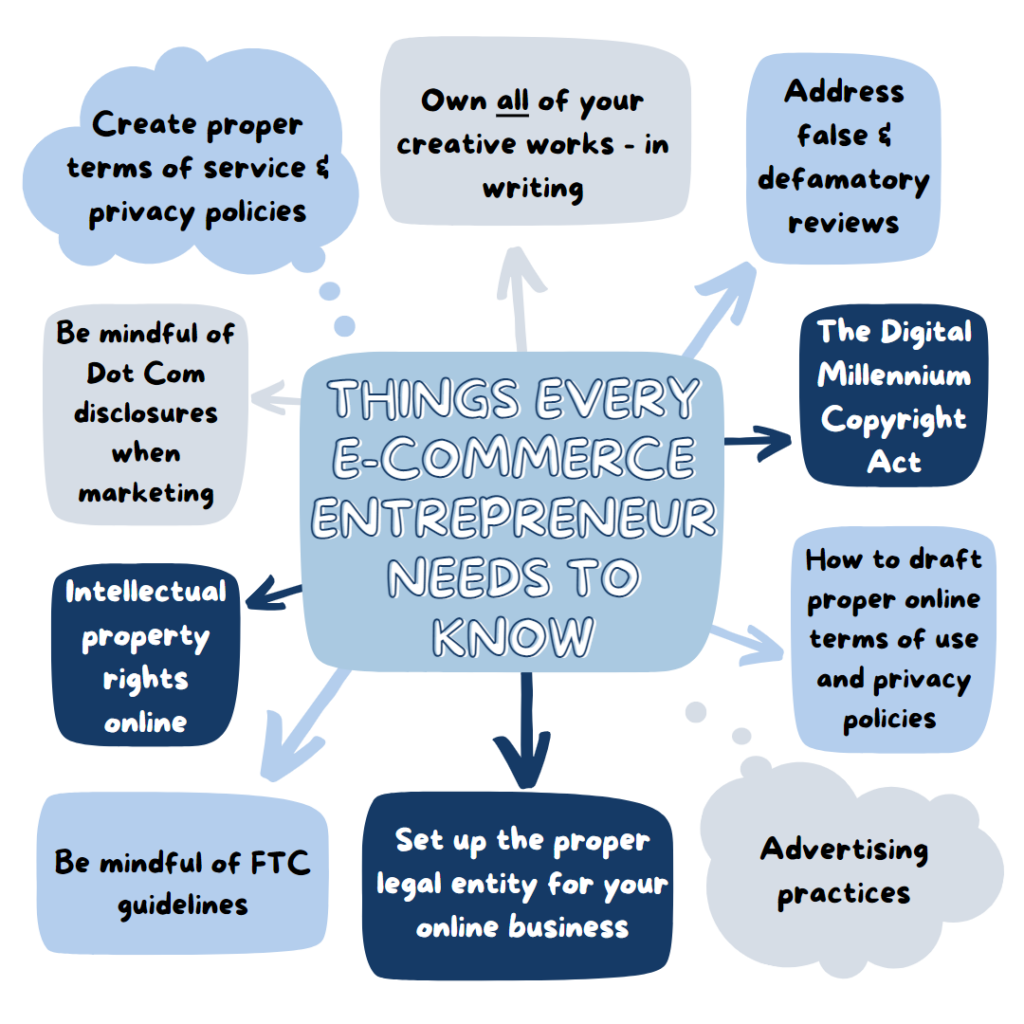Online Business Laws You Need to Know for Your E-Commerce Website
Online Business Laws You Need to Know for Your E-Commerce Website

The world of e-commerce has grown exponentially, as buying and selling electronically has become an easy alternative for Americans. By 2023, sales from the online retail industry are expected to reach a whopping 22% of all global retail sales. As the industry is expanding, so too are the internet laws and legal implications surrounding online businesses. This ensures that buyers and sellers are equally protected under the law when a transaction is made.
Important Online Business Laws Entrepreneurs Need to Know

In the same way that a business with a physical storefront must comply with the laws that govern its jurisdiction, online retail businesses have regulations that business owners must abide by. Failure to comply can result in expensive legal troubles. To secure yourself and your business, it is advisable to consult with an internet business lawyer who is familiar with e-commerce. The following is a summary of some of the regulations that online business owners must be aware of:
Taxes for an Online Business
If you operate an e-commerce business that also has a physical storefront or office, the law states that you will have to collect taxes from your customers. You must first apply for a tax ID for your business. Sales taxes vary, but all US-based online businesses are bound to charge them. In some states, the cities and counties may also levy their own local sales taxes, as well as special eco-taxes on harmful products such as plastics. If you are worried about miscalculating the correct amount to collect, you may want to seek help from a professional internet law firm or contact your state’s revenue agency.
Payment Gateways for an Online Business
It is vital that you ensure your customers are provided with a secure process when making an online purchase from your e-commerce business. Not only can this save your business from a hefty fine, but it also saves your brand image from being tarnished. One Atlanta-based payment processor suffered from a major credit card breach after it was hacked by cybercriminals in 2012. Over 1.5 million cards were potentially stolen, costing the company over $93 million USD. Therefore, choosing your payment processor is not a light decision to make. Take your payment security seriously by ensuring your payment processor is in compliance with the Payment Card Industry Data Security Standard (PCI DSS), they have an SSL certificate that enables an encrypted connection, and they have anti-fraud protection and integrated security.
Trademarks, Patents, and Copyrights for an Online Business
These regulations are not strictly needed to operate your online business, but they are helpful in keeping what’s yours protected—and this goes both ways. If your intellectual property is properly secured, then you won’t have to worry about other businesses using your works, inventions, ideas, phrases, etc., without your consent. However, if you infringe on another’s works, you can end up in legal trouble and will have to seek an internet lawyer.
Shipping and Delivery Policies and Inventory for an Online Business
There are some restrictions on shipping, so be sure to research if your product is restricted based on the carrier you choose to use. Every logistic carrier has different rules, so ensure you check the costs and requirements associated with each and then decide which one best suits your company.
Your customers must also have access to a clearly written delivery policy detailing how their purchase will be sent to them, the costs associated, and the expected delivery time. By providing clear information on the product—also available in your terms and conditions—dissatisfied customers can view this information and act accordingly. This will save you time and money if a customer is not happy.
Where you are shipping your inventory from is also an area to note. Depending on the type of e-commerce business you run, there are regulations for home-based businesses as well as zoning restrictions and health and safety permits to consider.
PCI DSS Compliance for an Online Business
PCI DSS compliance, short for Payment Card Industry (PCI) Data Security Standard (DSS), is a must-have for online business owners, as it helps to securely store, process, and transmit your buyers’ credit card information. By adhering to this standard, you are ensuring your customers get the best security practices. Many online business owners prefer to use a third party that is already PCI DSS certified to handle all their payment processing.
FTC Compliance for an Online Business
If you plan to collect personal information about the users of your website, then you should be familiar with the Federal Trade Commission (FTC) compliance guide. This US-based agency ensures consumers are protected from unfair business practices, including fraud and deception.
Business Insurance for an Online Business
Having business insurance is not mandatory for your online business, but it can help you out of some unexpected trouble. General, product, professional, or commercial liability insurance can protect you against products that may cause harm.
Refund Policy for an Online Business
Operating an online business without having a refund policy is not wise. There will be cases in which a customer may cancel their order and seek a refund. The law states that if an order is cancelled, it must be refunded within 14 days. Make sure your policy is available on your website so customers can view and accept the terms. The fewer reasons consumers will want to request a refund, the better your profit margin will look.
Age Restrictions for an Online Business
If you have a target audience that is under 13 years old, you must be familiar with the Children’s Online Privacy Protection Act (COPPA). This law protects the privacy of children under 13 by requesting parental consent for the collection or use of their personal information. You should also check the age restrictions on selling certain products through an online store.
Contact RM Warner Law
Contact RM Warner Law to make sure your online business is ready for any legal issues that arise. Our internet lawyers are well versed in the world of e-commerce and internet law and will ensure you are too. Schedule a consultation today by calling 1-866-570-8585 or contact us online today
Similar like this
You also might be interested in
How a Cyber Harassment Lawyer Can Help You Fight Online Abuse
The internet has changed the way we communicate, but it [...]
What To Do If You Appear on ‘Are We Dating the Same Guy’
How ‘Are We Dating the Same Guy’ Started Women have [...]
Buying and Selling Social Media Influence: What the FTC Wants You to Know
Influencing is a sought-after job these days! People are willing [...]
Top Legal Issues Arizona Internet Lawyers Can Help You Solve
The internet has become part of nearly every aspect of [...]





